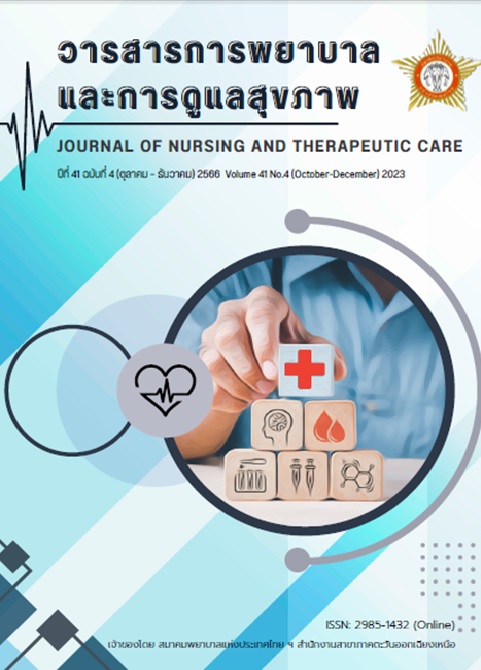ผลของโปรแกรมการสร้างเสริมความรอบรู้ด้านสุขภาพต่อระดับความรอบรู้ด้านสุขภาพ พฤติกรรมการดูแลตนเอง น้ำตาลสะสม และความดันโลหิตของผู้ป่วยโรคเบาหวานและ โรคความดันโลหิตสูง
คำสำคัญ:
ความรอบรู้ด้านสุขภาพ, พฤติกรรมการดูแลตนเอง, เบาหวานและความดันโลหิตสูงบทคัดย่อ
การวิจัยกึ่งทดลองแบบสองกลุ่มวัดก่อนและหลังเข้าร่วมโปรแกรมฯนี้ มีวัตถุประสงค์เพื่อศึกษาผลของโปรแกรมการสร้างเสริม ความรอบรู้ด้านสุขภาพต่อระดับความรอบรู้ด้านสุขภาพ พฤติกรรมการดูแลตนเอง น้ำตาลสะสม และความดันโลหิตของผู้ป่วยโรคเบาหวานและโรคความดันโลหิตสูง กลุ่มตัวอย่างเป็นผู้ป่วยที่เป็นทั้งโรคเบาหวานและโรคความดันโลหิตสูงที่มารับการรักษาที่ ศูนย์สุขภาพชุมชนวัดใต้ โรงพยาบาลสรรพสิทธิประสงค์ อุบลราชธานี จำนวน 48 คน ใช้วิธีการสุ่มอย่างง่าย แบ่งเป็นกลุ่มทดลองและกลุ่มควบคุมกลุ่มละ 24 คน กลุ่มทดลองได้รับโปรแกรมความรอบรู้ด้านสุขภาพเป็นเวลา 12 สัปดาห์ กลุ่มควบคุมเข้าร่วมกิจกรรมตามปกติ เก็บรวบรวมข้อมูลโดยใช้แบบสอบถามความรอบรู้ด้านสุขภาพ แบบสอบถามพฤติกรรมการดูแลตนเอง การตรวจระดับน้ำตาลสะสม วัดความดันโลหิตก่อนและหลังการทดลอง ทดสอบความตรงตามเนื้อหาของแบบสอบถามได้เท่ากับ .91 และ .93 ทดสอบความเที่ยงได้ค่าสัมประสิทธิ์ของครอนบาค เท่ากับ .78 และ .82 ตามลำดับ วิเคราะห์ข้อมูลใช้ค่าสถิติความถี่ ร้อยละ ค่าเฉลี่ย ส่วนเบี่ยงเบนมาตรฐาน, paired t-test, Independent t-test
ผลการวิจัย พบว่า หลังเข้าร่วมโปรแกรมการสร้างเสริมความรอบรู้ด้านสุขภาพ กลุ่มทดลองมีค่าเฉลี่ยคะแนนความรอบรู้ด้านสุขภาพสูงกว่าก่อนเข้าร่วมโปรแกรมและสูงกว่ากลุ่มควบคุมอย่างมีนัยสำคัญทางสถิติ ค่าเฉลี่ยคะแนนพฤติกรรมการดูแลตนเองสูงกว่าก่อนเข้าร่วมโปรแกรมและสูงกว่ากลุ่มควบคุมอย่างมีนัยสำคัญทางสถิติ ค่าเฉลี่ยน้ำตาลสะสมลดลงกว่าก่อนเข้าร่วมโปรแกรมและลดลงกว่ากลุ่มควบคุมอย่างมีนัยสำคัญทางสถิติ ค่าความดันซิสโตลิคและค่าความดันไดแอสโตลิคลดลงกว่าก่อนเข้าร่วมโปรแกรมและลดลงกว่ากลุ่มควบคุมอย่างมีนัยสำคัญทางสถิติ ผลการวิจัยแสดงให้เห็นว่าโปรแกรมการสร้างเสริมความรอบรู้ด้านสุขภาพได้ผลในการปรับเปลี่ยนพฤติกรรมการดูแลตนเอง ควบคุมระดับน้ำตาลสะสมและความดันโลหิตดีขึ้น ดังนั้นควรนำมาใช้ในการดูแลผู้ป่วยโรคเบาหวานและโรคความดันโลหิตสูงเพื่อให้ผู้ป่วยมีพฤติกรรมการดูแลตนเองได้เหมาะสมกับโรค ช่วยลดความรุนแรงและภาวะแทรกซ้อนได้
Downloads
เอกสารอ้างอิง
American Diabetes Association. 2. Classification and diagnosis of diabetes: standards of medical care in diabetes-2019. Diabetes Care 2019;42(Suppl.1):S13-28.
World Health Organization. Diabetes. [Internet]. [cited 2023 Jan 30] Avilable from: https://www.who.int/news-room/fact-sheets/detail/diabetes
Vargas-uricoechea H, Cáceres-acosta MF. Control of blood pressure and cardiovascular outcomes in type 2 diabetes. Open Med. 2018;13:304–23.
Grossman A, Grossman E. Blood pressure control in type 2 diabetic patients.Cardiovasc Diabetol. 2017;16(3):1-15.
Aekplakorn W, Puckcharoen H, Thaikla K, Satheannopakao W. Thai national health examination survey, NHES V, 2014.Nonthaburi: Health Systems Research Institute; 2016. (In Thai)
Aekplakorn W, Puckcharoen H, Satheannopakao W. Thai national health examination survey, NHES VI, 2019-2020. Nonthaburi: Health Systems Research Institute; 2020. (In Thai)
Hypertension Association of Thailand. Hypertension in diabetic patients. [Internet]. [cited 2023 Jan 30] Avilable from: http://www.thaihypertension.org/files/11.08Dec200618-AttachFile1165550538.pdf
Division of Non communicable Diseases. Details of indicators for monitoring and monitoring the quality of non-communicable disease operations services (Diabetes and Hypertension) 2022.[Internet]. [cited 2023 Jan 30] Avilable from: https://ddc.moph.go.th/uploads/publish/1186620211006043036.pdf
Forbes A, Murrells T, Sinclair AJ. Examining factors associated with excess mortality in older people (age ≥70 years) with diabetes -a 10-year cohort study of older people with and without diabetes. Diabet Med. 2017;34:387–95.
Pan American Health Organization. Diabetes. “Event World Diabetes Day”2022. [Internet]. [cited 2023 Jan 30] Avilable from: https://www.who.int/campaigns/world-diabetes-day/2022
Pavlou DI, Paschou SA, Anagnostis P, Spartalis M, Spartalis E, Vryonidou A, et al. . Hypertension in patients with type 2 diabetes mellitus: Targets and management. Maturitas. 2018;112:71–7.
Division of Non communicable Diseases. National 5-year strategic plan for prevention and control of non-communicable diseases[2022-2026] . Bangkok:Emotion Art; 2022. (in Thai)
Kaewsamrit A. Driving health literacy and health communication. 2018 [cited 2023 Jan 30] Avilable from: https://doh.hpc.go.th/data/HL/HL_DOH_drive.pdf (in Thai)
Division of Health Education. Health education program to promote health literacy among people with diabetes and Hypertension, new case. Bangkok: 25 Media Limited; 2020. (in Thai)
Nutbeam D. Defining, measuring and improving health literacy. HEP. 2015;42(4):450-5.
Berkman ND, Sheridan SL, Donahue KE, Halpern DJ, Crotty K. Low health literacy and health outcomes: An updated systematic review. Ann Intern Med. 2011;155(2):97-107.
Hanucharornkul S, editor. Self-care: the art and science of nursing care. 4th ed. Bangkok: V.J. printing; 2001. (in Thai)
Rattanawarang W, Janta W. Health literacy of self-care behaviors for blood glucose control in patients with type 2 diabetes, Chainat province. The Journal of Baromarajonani College of Nursing, Nakhon Ratchasima. 2018;24(2):34-51. (in Thai)
Suebpan J, Boonyamalik P, Kerdmongkol P. Effects of a health literacy promotion program on health behaviors in older adults with uncontrolled type 2 diabetes. Thai Red Cross Nursing Journal. 2021; 14(1):109-24. (in Thai)
Limrermsakul S, Saneha C, Wattanakitkrileart D, Buranasupkajorn P. Effects of a health literacy development program on self-care behaviors in the elderly with type 2 diabetes mellitus. Nursing Science Journal of Thailand. 2022;40(1):84-98. (in Thai)
Ya-in B. The effects of health literacy enhancement program on self-care behaviors of patients with uncontrolled diabetes type II, Chumsaeng hospital in Nakhonsawan province. Sawanpracharak Medical Journal. 2021;18(1):35-48. (in Thai)
Trongsakul S. The prevalence of undiagnosed cognitive impairment and prevalence of undiagnosed depressive mood in over 60’s with type 2 diabetes in a Thai community: a cross-sectional study [doctoral thesis]. Norwich: University of East Anglia; 2013.
Borson S, Scanlan JM, Chen P, Ganguli M. The Mini-Cog as a screen for dementia: validation in a population-based sample. J Am Geriatr Soc. 2003;51(10):1451-4.
Thanasukarn T, Neelapaijit N. Development of a tool to measure health literacy for patients diabetes mellitus and hypertension. Bangkok : Division of Health Education, Department of Health Service Support Ministry of Public Health in collaboration with Mahidol University; 2015. (in Thai)
Bains SS, Egede LE. Associations between health literacy, diabetes knowledge, self-care behaviors, and glycemic control in a low income population with type 2 diabetes. Diabetes Technol Ther. 2011;13(3):335-41.
Sriyasak A, Sarakshetrin A, Tongphet J, Ket-in V, Utaitum N, Mookui S, et al. The development of health literacy for health management of older persons with diabetes and hypertension in Primary Care Cluster Context: case study in Phetchaburi Province. Journal of Health Systems Research. 2021;15(2):155-73. (in Thai)
Chaowai S, Nimitanan N, Rujanawej S. The effect of health literacy enhancement program in new cases with type II diabetes mellitus patients in community. Chonburi Hospital Journal. 2019;44(1):25-34. (in Thai)
Moura NDS, Lopes BB, Teixeira JJD, Oriá MOB, Vieira NFC, Guedes MVC. Literacy in health and self-care in people with type 2 diabetes mellitus. Rev Bras Enferm. 2019;72(3):700-6.
Sinthuchai S, Namdej N, Kittiboonthawal P, Dejpitaksirikul S, Chuencham J, Ubolwan K, et al. Health literacy development model to promotesSelf-management behaviours and its health impact on older adults with both type 2 diabetes and hypertension, in Primary Care Clusters in Saraburi Province. Journal of Thailand Nursing and Midwifery Council. 2022;37(1):58-74. (in Thai)
ดาวน์โหลด
เผยแพร่แล้ว
รูปแบบการอ้างอิง
ฉบับ
ประเภทบทความ
สัญญาอนุญาต
ลิขสิทธิ์ (c) 2023 วารสารการพยาบาลและการดูแลสุขภาพ

อนุญาตภายใต้เงื่อนไข Creative Commons Attribution-NonCommercial-NoDerivatives 4.0 International License.



